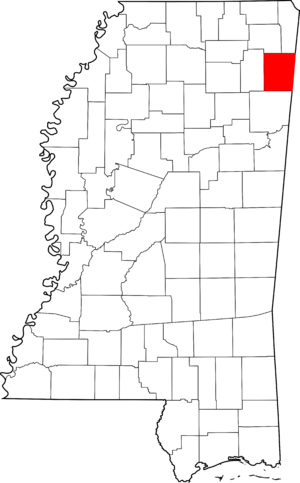National Register of Historic Places listings in Itawamba County, Mississippi facts for kids
Have you ever wondered about really old and important places in the United States? Some special spots are listed on something called the National Register of Historic Places. This list helps protect buildings, sites, and objects that are important to American history, architecture, archaeology, engineering, or culture.
In Itawamba County, Mississippi, there are two amazing places that are on this special list. These places are like treasures that tell us stories about the past. We can even find their exact locations on a map using special coordinates!
Discovering Historic Places in Itawamba County
| Name on the Register | Image | Date listed | Location | City or town | Description | |
|---|---|---|---|---|---|---|
| 1 | Pharr Mounds |
(#78000346) |
Mile 286.7 on the Natchez Trace Parkway 34°27′58″N 88°24′58″W / 34.4661°N 88.4161°W |
Kirkville | Extends into Prentiss County |
What are the Pharr Mounds?
The Pharr Mounds are a very old and important archaeological site. They are a group of eight burial mounds built by Native Americans long, long ago. These mounds are shaped like domes and are spread out over about 90 acres (which is like 90 football fields!).
Who built the Pharr Mounds?
Archaeologists believe the mounds were built by people of the Middle Woodland period, which was between 1 and 200 AD. That's almost 2,000 years ago! These ancient people were part of a culture that lived in the southeastern United States. They used these mounds as special places to bury their dead.
Where are the Pharr Mounds located?
You can find the Pharr Mounds along the Natchez Trace Parkway, a historic road that stretches through Mississippi, Alabama, and Tennessee. The mounds are near Kirkville, Mississippi, and actually extend into a neighboring county called Prentiss County. It's a great place to visit and imagine what life was like for the people who lived there so long ago. The site was added to the National Register of Historic Places on February 23, 1978, helping to protect it for future generations.



